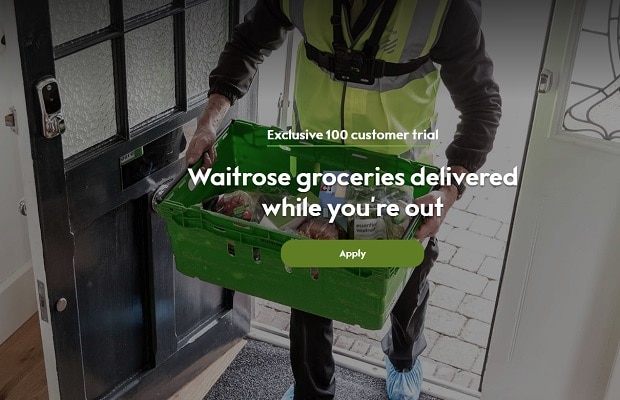
The scheme, named While You’re Away, will initially be trialled with 100 customers located near the supermarket chain’s fulfilment centre in Coulsdon, south London.
Customers taking part will need smart lock technology, allowing them to set a temporary access code which is sent to Waitrose via a secure app and then onto the delivery driver’s device when they arrive at the customer’s home.
The code is deleted once the delivery is complete.
Once inside the home, drivers will put suitable foods in the fridge and freezer and leave other groceries on the kitchen counter, or wherever the customer prefers.
The entire process is filmed on chest-camera worn by the driver, and the customer can see the video the following day if desired.
Customers must order at least six deliveries with a minimum order of £25 – conditions to be reviewed after the trial.
Similar schemes in the US and Scandinavia have proved successful and, if its pilot scheme also proves popular, Waitrose said it expected to be able to make the service available to more than 1,000 customers in spring 2019.
Archie Mason, head of business development at Waitrose & Partners, said: “There is certainly an increasing demand among our customers to make shopping with us even more convenient to fit around their busy lifestyles.
“A sea change for retailers”
Patrick Munden, Global Head of Retail at Wunderman Commerce (previously Salmon) commented on why this could be a sea-change in the way retailers and supermarkets could “lock in” their customers.
“Waitrose’s trial of in-home delivery is yet another way supermarkets and retailers are trying to make the customer journey even smoother and more convenient,” Munden said. “While giving delivery drivers access to consumers’ homes may raise some questions over privacy and security, our own recent research shows nearly half (49%) of UK and US consumers would be happy for someone to deliver and stock their fridges with groceries while they’re out.
“As consumer priorities become even more focused on price, delivery, convenience and speed of service – and with online grocery shopping yet to fully take off – Waitrose has a huge chance to take advantage of a relatively young market.
“It’ll come as no surprise that Amazon has already trialled this in the US with Amazon Key; and Waitrose will be under pressure to ensure their own technology stands up against Amazon’s to win over sceptics. What this move does reflect is a sea-change in the way retailers are thinking about how to “lock in” their customers. Challenger brands such as Aldi and Lidl are taking away a sizeable share of the UK’s more “traditional” supermarkets, so the key for the likes of Waitrose, Sainsbury’s and Tesco will be to continue innovating to keep pace with the convenience that customers are demanding. If this plan is successful, we can expect to see most other supermarkets piggyback off this idea next year.”
